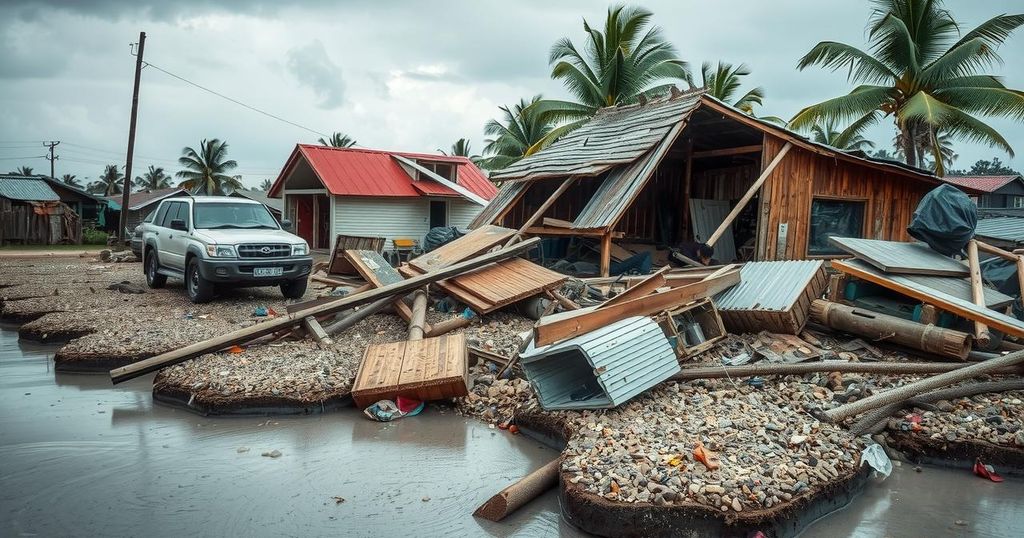Devastating Impact of Cyclone Chido in Mozambique and Surrounding Regions
Cyclone Chido has devastated northern Mozambique, displacing thousands and damaging infrastructure in Cabo Delgado and Nampula. UNHCR is providing urgent humanitarian assistance, with approximately 190,000 people in need of aid. The cyclone’s impacts compound existing vulnerabilities in a region already facing conflict and economic hardship.
Tropical Cyclone Chido has inflicted severe damage upon northern Mozambique, particularly affecting the provinces of Cabo Delgado and Nampula. The cyclone’s torrential rains and strong winds have resulted in widespread destruction of homes, displacing thousands and disrupting essential infrastructure including roads and communication systems. The challenging humanitarian situation has been compounded by prior conflicts and economic struggles, rendering many communities exceptionally vulnerable to such natural disasters.
In response to the cyclone, the UN Refugee Agency (UNHCR) is collaborating with the Government of Mozambique and various humanitarian partners to deliver immediate assistance to affected populations. Within the first 48 hours after the storm, UNHCR provided aid at Pemba’s largest accommodation center, offering emergency supplies such as blankets, sleeping mats, mosquito nets, and temporary shelter to over 2,600 individuals. The agency aims to extend its support to those most in need, ensuring protection and essential services.
Initial assessments indicate that approximately 190,000 individuals require urgent humanitarian aid, with reports of 33 damaged schools and nearly 10,000 homes lost to the storm. In numerous villages, only a few houses remain standing. Communities, already challenged by years of displacement and conflict, now face renewed suffering as Cyclone Chido has devastated their hard-won recoveries.
Prior to the cyclone’s landfall, UNHCR and its partners engaged in proactive measures to mitigate damage, pre-positioning emergency supplies and disseminating disaster preparedness communication across impacted provinces. While certain areas in Nampula were affected, Maratane refugee camp, home to over 8,000 refugees largely from the Democratic Republic of the Congo and Burundi, reported minimal damage due to recently improved climate-resilient housing.
The cyclone also caused significant destruction in Mayotte, a French overseas territory, impacting both infrastructure and vulnerable populations, including asylum seekers and refugees. UNHCR is closely monitoring the situation, coordinating relief efforts with local partners. The cyclone’s impact extended into southern Malawi as well, where strong winds and rains led to infrastructural damage. UNHCR has strategically placed shelter kits to assist in government-led recovery efforts.
There are growing concerns that Cyclone Chido could herald a dangerous rainy season likely to spur further cyclones and flooding, which historically jeopardizes the most vulnerable communities. The plight of displaced populations is increasingly precarious, emphasizing the critical need for continued support as they strive to recover from the cyclone’s effects. UNHCR remains committed to offering necessary assistance across the region, although there are rising concerns regarding resource availability as additional displaced individuals may require urgent help in the near future.
Cyclone Chido is a significant natural disaster that struck northern Mozambique, contributing to widespread devastation in the affected regions. The combination of pre-existing vulnerabilities—stemming from prolonged conflict and economic challenges—intensifies the impact of such cyclones on local populations. Agencies like UNHCR play a crucial role in disaster response, working alongside governments and humanitarian organizations to provide essential support in emergencies like these. The historical context of climate-related disasters in the area underscores the need for resilient infrastructure and preparedness to mitigate future impacts.
In summary, Cyclone Chido has wreaked havoc across northern Mozambique, resulting in the displacement of thousands and extensive damage to infrastructure. The collaborative efforts of UNHCR and local authorities highlight the continued need for humanitarian support in the face of climate-related challenges. As the region braces for potential future natural disasters, the urgency of sustained aid and the strengthening of resilience against such calamities cannot be overstated.
Original Source: www.unhcr.org




Post Comment